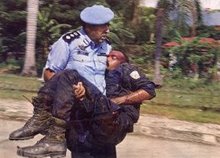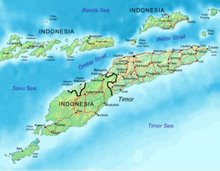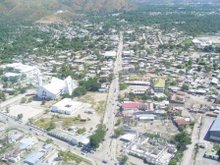By the 7.30 Report's ABC
A number of bodies have been uncovered in eroded soil on the boundary of the international airport in East Timor's capital, Dili, with human rights campaigners claiming they are victims of murder by the Indonesian military.
But East Timor's president says while the dead must be remembered, it is time to let go of the past and reconcile with Indonesia, a stance that is causing some anger.
The first clue to the airport's grisly secret was pieces of clothing exposed along the fence-line.
Photographs obtained by the ABC show that investigations at the site uncovered the remains of at least five people were exhumed from the site.
"From the initial reports, the only thing we assume is that these remains have been there for many years," acting United Nations police commissioner Juan Carlos Arevalo said.
The cause of death was easier to establish; two bullets had been delivered to the back of the head. Some victims were bound.
Human rights campaigners blame the former Indonesian occupiers of East Timor.
"The whole world knows Indonesia acted against human rights at this time, but the Indonesian Government does not take responsibility for their crimes," human rights campaigner Joes Luis Oliviera said.
Jose Ramos Horta says the victims found next to Dili airport should be honoured, but he has told the ABC that reconciliation with Indonesia is more important than dredging up its former crimes.
"We must not allow ourselves to be hostage of the past no matter how ugly that past was with relation to the Indonesian occupation," he said.
The case is now in the hands of East Timor's prosecutor-general.
Only he can order more exhumations and answer questions about whether more bodies lie under Dili's airport.
But even the country's President acknowledges that the mystery is unlikely to be solved, pointing out that the prosecutor already has 4,000 unresolved cases on his desk.
"I think for the families they've expressed frustration at the government's lack of support to progress the investigation," Australian forensic pathologist Dr Soren Blau said.
sábado, 20 de setembro de 2008
Subscrever:
Enviar feedback (Atom)







2 comentários:
jordan shoes
supreme clothing
adidas yeezy
air jordan
off white hoodie
kyrie 3
moncler
jordan shoes
hermes online
moncler
this contentlike this my companydig this my companyFull Report
Enviar um comentário